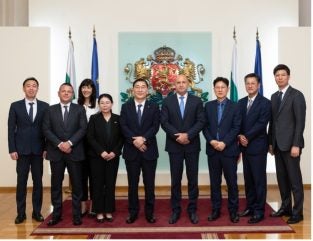
Bulgaria’s partnership with South Korea in the field of high technology and investments could receive an added impetus from the planned construction of Kozloduy NPP units 7&8, Bulgarian President Rumen during a visit to Sofia by South Korea’s Hyundai Engineering and Construction (Hyundai E&C).
US-based Westinghouse was awarded a front-end engineering & design contract with Kozloduy NPP subsidiary, Kozloduy NPP-Newbuild (KZNPP-NM – Kozloduy NPP Novi Mostnosti) in June 2023. In February 20024, Bulgaria and the US signed a formal agreement to collaborate on the construction of Kozloduy 7&8. The document outlines cooperation in nuclear power development and technology exchange. While the units are to have Westinghouse AP1000 reactors, Westinghouse will not take part in the construction but will retain overall control of the project.
Currently, Kozloduy NPP operates two Soviet-built VVER-1000 reactors (units 5&6). Bulgaria was obliged to close four older VVER-440 units as a condition for accession to the European Union, even though the units had undergone significant safety upgrades. According to the schedule, Kozloduy unit 7 should be operational in 2035 followed by unit 8 two years later.
Hyundai E&C, part of Hyundai Corporation has been selected to undertake the construction. Four other companies who expressed interest in the contract failed to meet the technical or financial conditions of the tender. The companies were identified as US Fluor BV, a consortium led by China National Nuclear Corporation Overseas, China Energy Engineering Corporation Limited and US Bechtel Nuclear Power Company Limited. Bulgaria’s National Assembly finally voted to support the Energy Ministry’s decision to invite Hyundai after a lengthy debate during which opposition parties unsuccessfully endeavoured to reinstate Bechtel as a contender.
The conditions Bulgaria has set for construction of Kozloduy 7&8 are that there must be a fixed price; unit 7 must be built within 60 months and unit 8 within 54 months; at least 30% of the budget and the activities should be assigned to Bulgarian contractors.
At the meeting with Hyundai E&C in the President’s Administration, Radev raised questions about construction deadlines; the separation of responsibilities among the Bulgarian government, Hyundai and Westinghouse; funding methods; and the management of spent nuclear fuel.
“The building of new nuclear units is a major challenge, but we can count on two important success factors: the Bulgarian expertise and experience in the safe and reliable operation of nuclear power facilities over half a century, and your expertise in this field,” Radev said. He insisted that more Bulgarian companies and experts who have proven themselves in nuclear energy should share in the construction of the new units.
Radev views the partnership with South Korea in nuclear energy as a chance for Bulgaria to attain a higher technological level and to maintain more vigorous scientific exchange with a view to achieving autonomy in the operation of the new reactors. He said Bulgaria has an interest in seeing the project completed on schedule, with clear financial parameters, because international practice shows that the building of nuclear capacities takes many years and financial parameters often change with time.
The Hyundai E&C management said the construction of Kozloduy 7&8 were to be completed between 2033 and 2035. Hyundai said they were working to ensure that the project fits within the planned temporal and budgetary framework, and view it as an undertaking of strategic importance for the company.
Bulgaria’s Caretaker Energy Minister Vladimir Malinov, who participated in the talks, said he hoped that in the summer of 2025, the project would be adopted in the National Assembly making it irreversible so it would be implemented in the shortest possible time and in the most competitive environment and economic conditions. He said that there must be maximum participation of Bulgarian businesses during design, procurement and construction of the new units. “My priority will be that the requirement for 30% participation of Bulgarian business will be the minimum starting threshold,” he said.
Malinov also said a key step is to find the best partners for securing financing for the project. He believes that the Export-Import Bank of Korea should play a key role. He said he is counting on the government of the Republic of Korea to support this process.
Delyan Dobrev, who chaired the energy committee in the previous Parliament, said the new National Assembly will not interfere in the project any more than it has done so far. In the second half of 2024, the project company must submit a final investment decision for Parliament’s approval. By the time the final investment decision is made, everything concerning cost, timing, contractors and financing will be clear, he said.
At the end of the talks, Hyundai E&C signed two memorandums of understanding – one with Bulgarian Construction Chamber, and one with and Glavbolgarstroy Holding.






